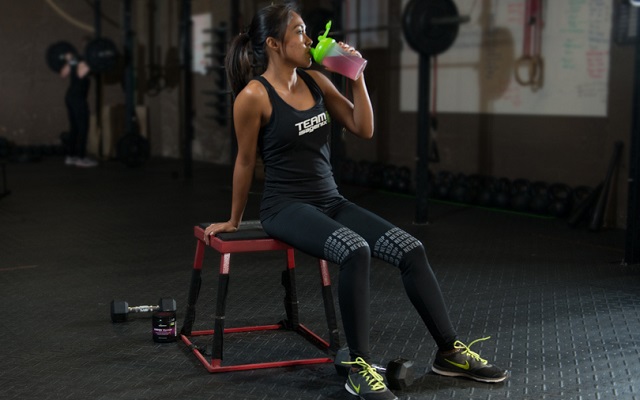Vegetarian athletes generally eat better than their meat-eating counterparts, but there are some nutrients (e.g. vitamin B12) that they lack including one crucial amino acid that is key to muscle performance and recovery: carnitine.
Normally, carnitine is supplied in meat and dairy products, items that vegetarians usually avoid unless they are ovo-lacto (able to consume eggs and dairy) (1, 2). Blood concentrations of carnitine in vegetarians are reported to be strikingly low or around 20-30 percent lower than their meat-eating counterparts and suggests that tissue carnitine stores in the body are also low in concentration (3).
Unfortunately, lower carnitine intake in vegetarians has received relatively little attention (4). But the role carnitine plays in the body is one of heavy involvement in energy metabolism and cellular protection. Additionally, 95 percent of the body’s carnitine is found in muscle tissue.
Carnitine supplementation is shown to correct low concentrations and support muscle recovery from exercise (5; 6). For example, in one study carnitine was found to be effective in reducing markers of exercise stress following just a single weight-training session (7). While the subjects in this study were not vegetarian, it suggested that vegetarian athletes would have most to gain from supplementing with carnitine.
Not only do vegetarians have a lower muscle content of carnitine, but they also have a reduced capacity to transport carnitine into the muscle when they don’t take it on a regular basis in comparison to non-vegetarians (8). Fortunately for vegetarians, they tend to impart a higher bioavailability of carnitine when it is eaten or supplemented, meaning their bodies are able to use it more efficiently than meat eaters (9). Exercising is also key to improving bioavailability of carnitine in vegetarians because muscle contractions increase the uptake of carnitine into the cells and help the body with the absorption process (10).
Carnitine has solid science to back it up. For example, a recent study from the University Hospital of Basel in Switzerland found that supplementation with carnitine significantly increased the carnitine concentration in blood in vegetarians by over 30 percent and the muscle carnitine content by 13 percent (4). Over the 12-week study, the vegetarians who took the 2 grams of supplemental carnitine were able to normalize their blood carnitine stores and perform at the same level of non-vegetarians!
While there are plenty of carnitine supplementation options on the market, L-carnitine tartrate is the form found in AMPED Recover that appears to have a faster absorption rate making it useful for time-critical situations, as in after a workout (11). Beyond having a scientifically demonstrated dose of carnitine, AMPED Recover also has branched-chain amino acids (BCAAs) to aid the muscle recovery process after a hard workout by triggering the cellular mechanisms for rebuilding proteins in muscle; another plus for vegetarians (12).
References
- Haddad EH & Tanzman JS. What do vegetarians in the United States eat? Am J Clin Nutr. 2003 Sep; 78(3 Suppl):626S-632S.
- Lombard KA, Olson AL, Nelson SE & Rebouche CJ. Carnitine status of lactoovovegetarians and strict vegetarian adults and children. Am J Clin Nutr. 1989 Aug; 50(2):301-6.
- Delanghe J, De Slypere JP, De Buyzere M, Robbrecht J, Wieme R & Vermeulen A. Normal reference values for creatine, creatinine, and carnitine are lower in vegetarians. Clin Chem. 1989 Aug; 35(8):1802-3.
- Novakova K, Kummer O, Bouitbir J, Stoffel SD, Hoerler-Koerner U, Bodmer M, Roberts P, Urwyler A, Ehrsam R & Krähenbühl S. Effect of L-carnitine supplementation on the body carnitine pool, skeletal muscle energy metabolism and physical performance in male vegetarians. Eur J Nutr. 2016 Feb; 55(1):207-17.
- Stephens FB, Wall BT, Marimuthu K, Shannon CE, Constantin-Teodosiu D, Macdonald IA & Greenhaff PL. Skeletal muscle carnitine loading increases energy expenditure, modulates fuel metabolism gene networks and prevents body fat accumulation in humans. J Physiol. 2013 Sep 15; 591(18):4655-66.
- Giamberardino MA, Dragani L, Valente R, Di Lisa F, Saggini R & Vecchiet L. Effects of prolonged L-carnitine administration on delayed muscle pain and CK release after eccentric effort. Int J Sports Med. 1996 Jul; 17(5):320-4.
- Spiering BA, Kraemer WJ, Vingren JL, Hatfield DL, Fragala MS, Ho JY, Maresh CM, Anderson JM & Volek JS. Responses of criterion variables to different supplemental doses of L-carnitine L-tartrate. J Strength Cond Res. 2007 Feb; 21(1):259-64.
- Stephens FB, Marimuthu K, Cheng Y, Patel N, Constantin D, Simpson EJ & Greenhaff PL. Vegetarians have a reduced skeletal muscle carnitine transport capacity. Am J Clin Nutr. 2011 Sep; 94(3):938-44.
- Flanagan JL, Simmons PA, Vehige J, Willcox MD & Garrett Q. Role of carnitine in disease. Nutr Metab (Lond). 2010 Apr 16; 7:30.
- Furuichi Y, Sugiura T, Kato Y, Takakura H, Hanai Y, Hashimoto T & Masuda K. Muscle contraction increases carnitine uptake via translocation of OCTN2. Biochem Biophys Res Commun. 2012 Feb 24; 418(4):774-9.
- Rebouche CJ. Kinetics, pharmacokinetics, and regulation of L-carnitine and acetyl-L-carnitine metabolism. Ann N Y Acad Sci. 2004 Nov; 1033:30-41.
- Du M, Shen QW, Zhu MJ & Ford SP. Leucine stimulates mammalian target of rapamycin signaling in C2C12 myoblasts in part through inhibition of adenosine monophosphate-activated protein kinase. J Anim Sci. 2007 Apr; 85(4):919-27.





